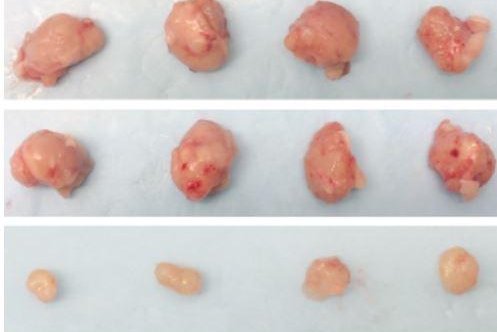A new study demonstrated that using two currently available drugs could be an effective treatment for the majority of lung cancers. The bottom row shows tumors treated with the drug combo, compared with tumors without treatment or with single treatments above. Photo courtesy of
UT Southwestern Medical Center
April 4 (UPI) -- Two drugs already on the market were effective in treating most forms of lung cancer, according to new research with mice.
The 1-2 combo of drugs -- one attacking epidermal growth factor receptor, or EGFR, and another one targeting tumor necrosis factor -- prevents the cancer from using TNF to escape. Then, the inflammation-induced cancer becomes sensitive to EGBR drugs.
The findings were published Tuesday in the Journal of Clinical Investigation by researchers at University of Texas Southwestern's Simmons Cancer Center in Dallas.
"Blocking both of these proteins could be a treatment that is beneficial for the majority of lung cancer patients," Dr. Amyn Habib, a researcher at the Harold C. Simmons Comprehensive Cancer Center at UT Southwestern and a staff physician at the Dallas Veterans Affairs Medical Center, said in a press release.
Because the drugs have already been approved by the Food and Drug Administration, the researchers hope to be able to launch a phase 2 trial within a year.
"If this strategy is effective, then it might be broadly applicable not only against lung cancer but also against other cancers that express EGFR, which include brain, colon, and head and neck cancers," said Dr. David Gerber, also with the Simmons Cancer Center, who will lead the trial.
Lung cancer, the most common cause of cancer death in the U.S. for men and women, caused 26 percent of all cancer deaths in 2017, according to the National Cancer Institute. Non-small cell lung cancer comprises approximately 85 percent of all lung cancers.
Previously, EGFR inhibitors have only been effective at treating 10 percent to 15 percent of non-small cell lung cancers that have a variant of EGFR.
"There has been a tremendous effort over the past several years to block EGFR as a treatment for lung cancer, but this therapy only works in a small subset of patients," Habib said. "The cancer fights back with a bypass pathway."
The drugs have few side effects because inhibitors fall into the category of targeted drugs, meaning they affect specific molecules within cancer cells.
Traditional chemotherapy drugs kill cells in cancerous and healthy tissue alike, and have many side effects.
"This finding has the possibility of dramatically altering how we treat lung cancer," said Dr. John Minna, who holds the Sarah M. and Charles E. Seay Distinguished Chair in Cancer Research and the Max L. Thomas Distinguished Chair in Molecular Pulmonary Oncology at UT Southwestern.
Bristol-Meyers Squibb's Cetuximab, which is administered intravenously, was the first EGFR to go on the market in 2004. Oral drugs are now available.
The TNF drugs are injected to treat inflammation, with AbbVie's Humira dominating the market.















